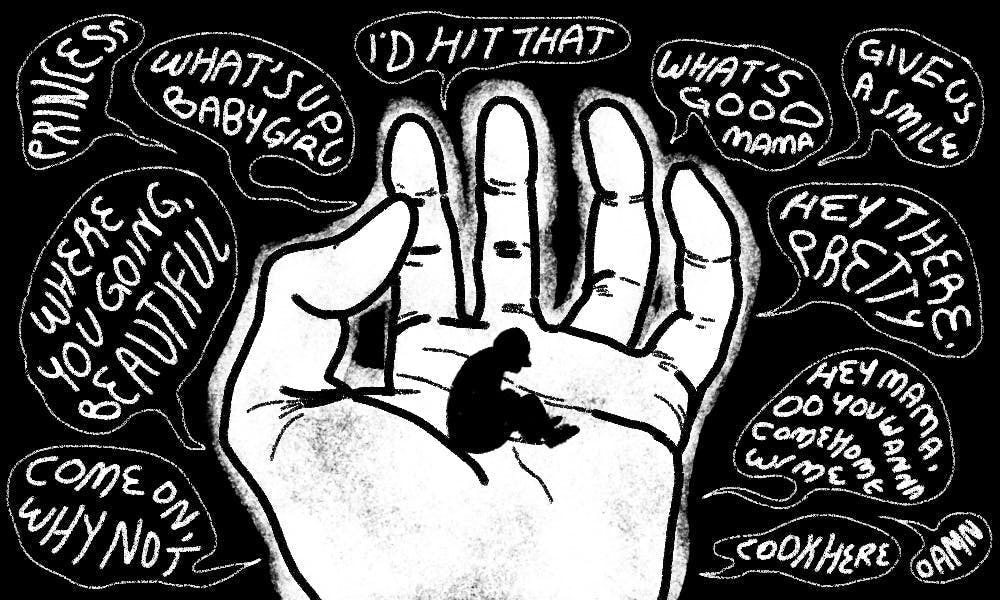Content warning: The following text describes rape and sexual assault, which can be disturbing or triggering for some readers. Please find resources listed at the bottom of the article.
I’ve always been a drunk crier. When I came to college, I sat on the floor of a dirty off–campus frat house and cried about my body image. A few weeks later, I was crying in my boyfriend’s arms about being homesick. I’ve drunk cried about a dog I saw on the street, and I've cried about graduating and leaving behind my normal life. Hand in hand with crying, I love to overshare after a few sips. I am my own least favorite type of drunk.
I recently ended a night in tears on the bathroom floor after telling someone I had been raped. I don’t remember the details I shared, but I won’t forget the shame I felt the next week. I spent three days in bed long after the hangover had subsided, riddled with anxiety about what I had said.
I’d avoided thinking about that night for a long time, but as news stories picked up about violence against women, so did my memories. After the murder of Sarah Everard in March, social media was flooded with statistics about violence against women. I felt the pain of girls I saw on TikTok realizing they fell into the 97% of women who have experienced sexual harassment. I tried to bury that I was in that statistic even before being raped. I’d been in it since a high school boyfriend had decided coercion was 'encouragement,' a guy at a party thought he could push my boundaries, and a person I trusted didn’t understand my resistance to his moves.
About a week after learning about Sarah’s death, I was suddenly flooded with the trauma of what being a woman has brought me. I let the wave hit me as I was taking a shower, then picked myself up and got back to my day. I knew I was going to burst at some point.
No one but the nurses at the Student Health Service knew about the night I had after going home with a stranger from Smokey Joe's. I had to fabricate a story about it, fake–laughing with mutual friends who thought it was a one–night stand. I had to replace objects lost on his bedroom floor, while convincing myself it wasn’t rape because it wasn’t violent like the movies. It was in a college apartment, lit up by LED string lights after a night of green tea shots. I’d had drunken hookups before—why was this any different?
I don’t hate him. He may not have known what he was doing. I’ve learned now that that doesn’t change what was done to me. I'd stumbled from an unknown house with tears running down my face at 3 a.m. I didn’t shower for days because I’d read that rape kits should be done before a shower, but I hadn’t had the motivation to get one. I showed up at SHS the minute before closing for a walk–in STI test that apparently did not exist. I was quietly pulled into a closed room when I said that “I can’t remember” if we used protection. None of this happens after a one–night stand.
As accusations of predatory behavior and assault have poured in against Gov. Andrew Cuomo, my feed was again recently filled with posts about how to support survivors. I’m tired of us pasting the numbers, but never acknowledging where they come from.
What percentage of fraternity brothers, roommates, and classmates have taken that blacked–out girl from Smokes' home, then turned around and told you about the wild one–night stand they’d had? How many more times do you have to be told that your buddy creeps someone out before they’re not worth supporting? How many of them will go on to be CEOs, politicians, and presidents who lock their office doors as an employee walks in?
I’ve carried this burden with me for a year in silence. The morning after my rape, I’d woken up in my friend’s bed, my eyes puffy from crying. I shot off a “Sorry, bad night” text and ran to the club event I was late to, playing it off as an awkward sexual encounter and a hangover. I intended to bury my reality. The recent onslaught of “How to Keep Women Safe” posts from people I’ve seen get drinks with men who have assaulted or raped me has been too much to handle.
And so a few weeks ago, I got too drunk again, and I ruined someone’s night with my story. Except this time, instead of being harmed, I was hugged. I didn’t leave alone in the dark or wake up in a strange bed—I was just listened to by a friend with pain in his eyes.
I’m tired of being embarrassed by my tears when they are a result of others' actions. My little crying session isn’t ruining any night more than a rape ruined mine. It’s a sign of pain held in for far too long by someone who the world has told, "This is part of life." It’s time for the friends of rapists, rapists themselves, and everyone in between to pick up some of the burden.
Campus Resources:
The HELP Line: 215-898-HELP: A 24–hour–a–day phone number for members of the Penn community who seek help in navigating Penn's resources for health and wellness.
Counseling and Psychological Services: 215-898-7021 (active 24/7): The counseling center for the University of Pennsylvania.
Student Health Service: 215-746-3535: Student Health Service can provide medical evaluations and treatment to survivors of sexual and relationship violence regardless of whether they make a report or seek additional resources. Both male and female providers can perform examinations, discuss testing and treatment of sexually transmissible infections, provide emergency contraception if necessary, and arrange for referrals and follow up.
Reach–A–Peer Hotline: 215-573-2727 (every day from 9 p.m. to 1 a.m., texting available 24/7): A peer hotline to provide peer support, information, and referrals to Penn students.
Penn Violence Prevention: PVP provides confidential support and resources to students affected by sexual violence, relationship violence, and stalking.
Sexual Trauma Treatment Outreach and Prevention Team: A multidisciplinary team at CAPS dedicated to supporting students who have experienced sexual trauma.
Public Safety Special Services: 215-898-6600 (active 24/7): Trained personnel offer crisis intervention, accompaniment to legal and medical proceedings, options counseling and advocacy, and linkages to other community resources.
Penn Women's Center: 215-898-8611 (Monday–Thursday 9:30 a.m.-6:30 p.m., Friday 9:30 a.m.–5 p.m.): PWC provides confidential crisis and options counseling.







